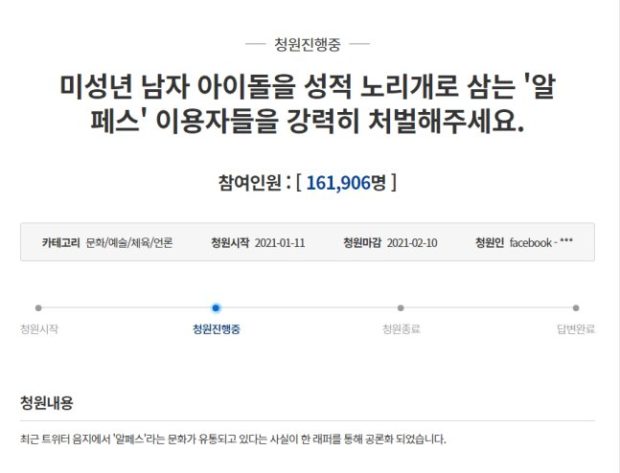SEOUL — A presidential petition calling for stern punishment for those creating fan fiction called “real person slash,” or RPS, sexualizing underage male idols began garnering support Wednesday, triggering questions as to whether it can be seen as a form of idol culture or if it constitutes a digital sex crime.
“Real person slash is a culture of sexual crime, which features real male idols and describes pervert-like sexual intercourse and rape in an unspeakably explicit manner, and countless male celebrities have been sexualized through this culture,” the petitioner said.
Real person slash, a genre of fiction involving real people similar to fan fiction, often involves homosexual relationships and sexual acts between K-pop idols. Some of its content is highly inappropriate, containing scenes of rape and sexual crimes. Such works can be accessed via social media, in many cases for free, or on Postype, a paid platform for creative content.
Fan fiction refers to unofficial works written by fans involving real celebrities or characters from established intellectual property, with K-pop groups one such frequent target. Those involved in producing and consuming fan fiction are typically thought to be teenagers.
The petitioner labeled those producing and consuming real person slash as perpetrators of sexual crimes, taking advantage of the young male idols’ vulnerable positions depending on the love and attention from fans.
“Whether the victim is a woman or man, whether the victim has power or not, nobody should be subjected to sexual crime culture,” the petitioner said, urging the government to punish those consuming such content and to draw up measures to regulate the distribution of such “sexual crime” fiction.
The petition, which was registered Monday, had received more than 163,000 signatures as of 10 a.m. Wednesday.
Another petition mirroring that on real person slash was also uploaded Monday, calling for stern punishment for those reading such fiction sexualizing real female K-pop idols. Nearly 20,100 people had signed the petition.
The controversy over real person slash surfaced after Korean rapper Son Simba accused those supporting and consuming slash fiction and deep fake pornography of pursuing “sexual crimes,” and not merely constituting a fringe culture.
“Are there people who collectively cover up or even support fictions and drawings on pervert-like sexual intercourse involving real people who were forced (by such fictions) into irresistible situations,” he asked on his Instagram with the hashtag “RealPersonSlashIsSexualCrime” in Korean.
Popular rapper BewhY supported Son Simba by retweeting a tweet with a screenshot of the presidential petition calling for the punishment of those consuming slash fiction.
Rep. Ha Tae-keung of the main opposition People Power Party joined the debate, calling for a proactive response from the government and relevant law enforcement agencies to warn society that “excessive love for idol singers” could constitute a crime.”
“I checked it on the website selling real person slash to see how serious the problem was and it was shocking. Scenes of explicit sexual intercourse between male idols were described and in some fictions male idols set as high school students were raped,” he said on his social media.
Some creators of real fiction slash shared their feelings on Postype.
“As I mentioned before, I am a timid person and have felt guilty to some extent about creating real person slash. It might have been my illusion or justification that this act (of writing real person slash), which is neither legitimate nor illegitimate, could be protected on Postype,” one of the real person slash writers, who goes by the nickname “Shashak,” wrote Tuesday.
“In conclusion, I will stop this activity and take time to think it over,” the writer said.
Another real person slash writer, who goes by the nickname “Dearna,” defended real person fiction as “creative work” that uses celebrities as main characters to create fictional storylines as part of fan culture.
“It is disgusting to liken real person slash to deep fakes,” the writer said via Postype on Tuesday, adding that deep fake videos can be a sexual crime, but real person slash is not intended to relieve any sexual urges.
Deep fakes refer to realistically manipulated videos or digital representations, which have often become the source of digital sex crimes. Facial features of existing videos and images can be replaced by the face of another person. Deep fakes came to light after a gang of criminals was convicted of producing deep fake pornography with celebrities’ faces and distributing it through an illegal website in the infamous “Nth room” case.
The issue of real person slash was brought to the fore recently amid controversy over the social media-based artificial intelligence chatbot Lee Luda, which was designed to speak like a 20-year-old female university student. Upon its launch, Lee Luda became subject to sexual abuse among some online users, leading its developer Scatter Lab to suspend the chatbot services Monday.
The AI chat bot also created a stir with its prejudiced and discriminatory language against women and minorities.
